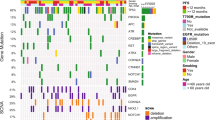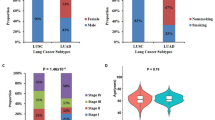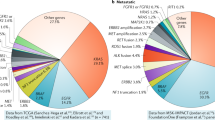Abstract
Background
Tumour heterogeneity impacts the efficacy of metastatic cancer treatment even if actionable mutations are identified. Clinicians need to understand if assessing one lesion provides reliable information to drive a therapeutic decision in non-small-cell lung cancer (NSCLC) patients.
Methods
We analysed inter-tumour heterogeneity from five autopsied individuals with NSCLC-harbouring mutations in the epidermal growth factor receptor (EGFR), treated with EGFR tyrosine kinase inhibitors (TKIs). Through a comprehensive next-generation sequencing (NGS) oncopanel, and an EGFR panel for digital droplet PCR (ddPCR), we compared metastases within individuals, longitudinal biopsies from the same lesions and, whenever possible, the primary naive tumour.
Results
Analysis of 22 necropsies from five patients revealed homogeneity in pathogenic mutations and TKI-resistance mechanisms within each patient in four of them. In-depth analysis by whole-exome sequencing from patient 1 confirmed homogeneity in clonal mutations, but heterogeneity in passenger subclonal alterations. Different resistance mechanisms were detected depending on the patient and line of treatment. Three patients treated with a c-MET inhibitor in combination with TKI lost MET amplification upon progression.
Conclusion
At a given point and under selective TKI pressure, a single metastasis biopsy in disseminated tumours from EGFR-mutated NSCLC patients could provide a reasonable assessment of actionable alterations useful for therapeutic decisions.
This is a preview of subscription content, access via your institution
Access options
Subscribe to this journal
Receive 24 print issues and online access
$259.00 per year
only $10.79 per issue
Buy this article
- Purchase on Springer Link
- Instant access to full article PDF
Prices may be subject to local taxes which are calculated during checkout




Similar content being viewed by others
Data availability
These data will be held at VHIO on secure servers. VHIO is supportive of data sharing and will endeavour to assist in requests for data sharing. All requests for access to the data will be formally requested stating the purpose, analysis and publication plans together with the named collaborators. All requests will be dealt with on a case by case basis in strict observance of applicable laws, rules and regulations.
References
Mehta A, Dobersch S, Romero-Olmedo AJ, Barreto G. Epigenetics in lung cancer diagnosis and therapy. Cancer Metastasis Rev. 2015;34:229–41.
Meaney CL, Zingone A, Brown D, Yu Y, Cao L, Ryan BM. Identification of serum inflammatory markers as classifiers of lung cancer mortality for stage I adenocarcinoma. Oncotarget. 2017;8:40946–57.
Castellanos E, Feld E, Horn L. Driven by mutations: the predictive value of mutation subtype in EGFR-mutated non-small cell lung cancer. J Thorac Oncol. 2017;12:612–23.
Veronesi G. Lung cancer screening. Thorac Surg Clin. 2015;25:161–74.
Iacobuzio-Donahue CA, Michael C, Baez P, Kappagantula R, Hooper JE, Hollman TJ. Cancer biology as revealed by the research autopsy. Nat Rev Cancer. 2019;19:686–97.
Mayo-de-las-Casas C, Garzón Ibáñez M, Jordana-Ariza N, García-Peláez B, Balada-Bel A, Villatoro S, et al. An update on liquid biopsy analysis for diagnostic and monitoring applications in non-small cell lung cancer. Expert Rev Mol Diagn. 2018;18:35–45.
Postel M, Roosen A, Laurent-Puig P, Taly V, Wang-Renault S-F. Droplet-based digital PCR and next generation sequencing for monitoring circulating tumor DNA: a cancer diagnostic perspective. Expert Rev Mol Diagn. 2018;18:7–17.
Sunami K, Takahashi H, Tsuchihara K, Takeda M, Suzuki T, Naito Y, et al. Clinical practice guidance for next-generation sequencing in cancer diagnosis and treatment (Edition 1.0). Cancer Sci. 2018;109:2980–5.
Wang DC, Wang W, Zhu B, Wang X. Lung cancer heterogeneity and new strategies for drug therapy. Annu Rev Pharm Toxicol. 2018;58:531–46.
de Sousa VML, Carvalho L. Heterogeneity in lung cancer. Pathobiology. 2018;85:96–107.
Watanabe S, Minegishi Y, Yoshizawa H, Maemondo M, Inoue A, Sugawara S, et al. Effectiveness of gefitinib against non-small-cell lung cancer with the uncommon EGFR mutations G719X and L861Q. J Thorac Oncol. 2014;9:189–94.
Wu JY, Yu CJ, Chang YC, Yang CH, Shih JY, Yang PC. Effectiveness of tyrosine kinase inhibitors on “uncommon” epidermal growth factor receptor mutations of unknown clinical significance in non-small cell lung cancer. Clin Cancer Res. 2011;17:3812–21.
Yeh CH, Bellon M, Nicot C. FBXW7: a critical tumor suppressor of human cancers. Molecular Cancer. BioMed Central Ltd. 2018;17:1–19.
Xiao Y, Yin C, Wang Y, Lv H, Wang W, Huang Y, et al. FBXW7 deletion contributes to lung tumor development and confers resistance to gefitinib therapy. Mol Oncol. 2018;12:883–95.
Yokobori T, Yokoyama Y, Mogi A, Endoh H, Altan B, Kosaka T, et al. FBXW7 mediates chemotherapeutic sensitivity and prognosis in NSCLCs. Mol Cancer Res. 2014;12:32–7.
Yu HG, Wei W, Xia LH, Han WL, Zhao P, Wu SJ, et al. FBW7 upregulation enhances cisplatin cytotoxicity in nonsmall cell lung cancer cells. Asian Pacific J Cancer Prev. 2013;14:6321–6.
Shibata T, Saito S, Kokubu A, Suzuki T, Yamamoto M, Hirohashi S. Global downstream pathway analysis reveals a dependence of oncogenic NF-E2-related factor 2 mutation on the mTOR growth signaling pathway. Cancer Res. 2010;70:9095–105.
Singh A, Bodas M, Wakabayashi N, Bunz F, Biswal S. Gain of Nrf2 function in non-small-cell lung cancer cells confers radioresistance. Antioxid Redox Signal. 2010;13:1627–37.
McDonald JT, Kim K, Norris AJ, Vlashi E, Phillips TM, Lagadec C, et al. Ionizing radiation activates the Nrf2 antioxidant response. Cancer Res. 2010;70:8886–95.
Jeong Y, Hoang NT, Lovejoy A, Stehr H, Newman AM, Gentles AJ, et al. Role of KEAP1/NRF2 and TP53 mutations in lung squamous cell carcinoma development and radiation resistance. Cancer Discov. 2017;7:86–101.
Ariyasu R, Nishikawa S, Uchibori K, Oh-hara T, Yoshizawa T, Dotsu Y, et al. High ratio of T790M to EGFR activating mutations correlate with the osimertinib response in non-small-cell lung cancer. Lung Cancer. 2018;117:1–6.
Chabon JJ, Simmons AD, Lovejoy AF, Esfahani MS, Newman AM, Haringsma HJ, et al. Circulating tumour DNA profiling reveals heterogeneity of EGFR inhibitor resistance mechanisms in lung cancer patients. Nat Commun. 2016;7:11815.
Piotrowska Z, Niederst MJ, Karlovich CA, Wakelee HA, Neal JW, Mino-Kenudson M, et al. Heterogeneity underlies the emergence of EGFRT790 wild-type clones following treatment of T790M-positive cancers with a third-generation EGFR inhibitor. Cancer Discov. 2015;5:713–22.
Tamborero D, Rubio-Perez C, Deu-Pons J, Schroeder MP, Vivancos A, Rovira A, et al. Cancer Genome Interpreter annotates the biological and clinical relevance of tumor alterations. Genome Med. 2018;10:25.
Gao J, Aksoy BA, Dogrusoz U, Dresdner G, Gross B, Sumer SO, et al. Integrative analysis of complex cancer genomics and clinical profiles using the cBioPortal. Sci Signal. 2013;6:pl1–pl1.
Cerami E, Gao J, Dogrusoz U, Gross BE, Sumer SO, Aksoy BA, et al. The cBio cancer genomics portal: an open platform for exploring multidimensional cancer genomics data. Cancer Discov. 2012;2:401–4.
Friedman R. Drug resistance in cancer: molecular evolution and compensatory proliferation. Oncotarget. 2016;7:11746–55.
Inukai M, Toyooka S, Ito S, Asano H, Ichihara S, Soh J, et al. Presence of epidermal growth factor receptor gene T790M mutation as a minor clone in non-small cell lung cancer. Cancer Res. 2006;66:7854–8.
Turke AB, Zejnullahu K, Wu YL, Song Y, Dias-Santagata D, Lifshits E, et al. Preexistence and clonal selection of MET amplification in EGFR mutant NSCLC. Cancer Cell. 2010;17:77–88.
Lai GGY, Lim TH, Lim J, Liew PJR, Kwang XL, Nahar R, et al. Clonal MET amplification as a determinant of tyrosine kinase inhibitor resistance in epidermal growth factor receptor-mutant non-small-cell lung cancer. J Clin Oncol. 2019;37:876–84.
Gerlinger M, Rowan AJ, Horswell S, Larkin J, Endesfelder D, Gronroos E, et al. Intratumor heterogeneity and branched evolution revealed by multiregion sequencing. N. Engl J Med. 2012;366:883–92.
Jamal-Hanjani M, Wilson GA, McGranahan N, Birkbak NJ, Watkins TBK, Veeriah S, et al. Tracking the evolution of non-small-cell lung cancer. N. Engl J Med. 2017;376:2109–21.
Sequist LV, Waltman BA, Dias-Santagata D, Digumarthy S, Turke AB, Fidias P, et al. Genotypic and histological evolution of lung cancers acquiring resistance to EGFR inhibitors. Sci Transl Med. 2011;3:75ra26–75ra26.
Roper N, Brown A-L, Wei JS, Pack S, Trindade C, Kim C, et al. Clonal evolution and heterogeneity of osimertinib acquired resistance mechanisms in EGFR mutant lung cancer. Cell Rep. Med. 2020;1:100007.
Kim S, Kim TM, Kim D-W, Kim S, Kim M, Ahn Y-O, et al. Acquired resistance of MET-amplified non-small cell lung cancer cells to the MET inhibitor capmatinib. Cancer Res Treat. 2019;51:951–62.
Awad MM, Katayama R, McTigue M, Liu W, Deng Y-L, Brooun A, et al. Acquired resistance to crizotinib from a mutation in CD74–ROS1. N. Engl J Med. 2013;368:2395–401.
Turajlic S, Xu H, Litchfield K, Rowan A, Chambers T, Lopez JI, et al. Tracking cancer evolution reveals constrained routes to metastases: TRACERx renal. Cell. 2018;173:581–94.e12.
Noorani A, Li X, Goddard M, Crawte J, Alexandrov LB, Secrier M, et al. Genomic evidence supports a clonal diaspora model for metastases of esophageal adenocarcinoma. Nat Genet. 2020;52:74–83.
Suda K, Murakami I, Sakai K, Tomizawa K, Mizuuchi H, Sato K, et al. Heterogeneity in resistance mechanisms causes shorter duration of epidermal growth factor receptor kinase inhibitor treatment in lung cancer. Lung Cancer. 2016;91:36–40.
Reiter JG, Makohon-Moore AP, Gerold JM, Heyde A, Attiyeh MA, Kohutek ZA, et al. Minimal functional driver gene heterogeneity among untreated metastases. Science. 2018;361:1033–7.
Reiter JG, Baretti M, Gerold JM, Makohon-Moore AP, Daud A, Iacobuzio-Donahue CA, et al. An analysis of genetic heterogeneity in untreated cancers. Nat Rev Cancer. 2019;19:639–50.
Juric D, Castel P, Griffith M, Griffith OL, Won HH, Ellis H, et al. Convergent loss of PTEN leads to clinical resistance to a PI(3)K a inhibitor. Nature. 2015;518:240–4.
Dagogo-Jack I, Shaw AT. Tumour heterogeneity and resistance to cancer therapies. Nat Rev Clin Oncol. 2018;15:81–94.
Acknowledgements
We would like to thank Dr. Alberto Moldón for helping with manuscript preparation.
Funding
This work was supported by the Spanish Cancer Association (AECC) Scientific Foundation (GCB14-2170) and partially by the Spanish Ministries of Health and Fondo de Investigación Sanitaria-Fondo Europeo de Desarrollo Regional (PI14/01248). MS was supported by an AECC Investigator award from the Spanish Cancer Association (AECC) Scientific Foundation (INVES19056SANS) and is currently supported by a Radix fellowship funded by IdISBa and Janssen.
Author information
Authors and Affiliations
Contributions
AMM: conceptualisation, visualisation, methodology, formal analysis, data curation, writing, review and editing. EF: conceptualisation, methodology, formal analysis, supervision, data curation, writing, review, editing and funding acquisition. FMM: bioinformatic analysis and review of the manuscript. GC and JM: performed all DNA extractions, sequencing and ddPCR experiments. PN and IS: performed histopathological analysis and review of the manuscript. NMD, SC, AC, PI, NP and AN: review and editing of the manuscript. JMM: project administration, visualisation and review of the manuscript. AV: conceptualisation, methodology, formal analysis, data curation, review, editing and funding acquisition. MS: conceptualisation, visualisation, methodology, formal analysis, supervision, data curation, writing, review and editing. All authors provided comments on the manuscript and had final approval of the submitted version.
Corresponding author
Ethics declarations
Ethics approval and consent to participate
Approval to use these tumour specimens was obtained from the institutional review board and performed in accordance with the Declaration of Helsinki. All samples were obtained with the patients’ informed consent.
Consent to publish
No individually identifiable data are presented.
Competing interests
AMM provided consultation, attended advisory boards and/or speaker’s bureau for the following organisations: BMS, Roche, MSD, Pfizer, Boehringer-Ingelheim, AstraZeneca. EF provided consultation, advisory role and/or speaker’s bureau: AbbVie, AstraZeneca, Blueprint medicines, Boehringer-Ingelheim, BMS, Celgene, Lilly, Guardant Health, Janssen, Medscape, Merck KGaA, MSD, Novartis, Pfizer, Roche, Takeda, Touchtime. PN provided consultation, advisory role and/or speaker’s bureau: Bayer, MSD, Novartis, and Targos. IS provided consultation, attended advisory boards and/or speaker’s bureau for the following organisations: Roche, Abbvie, MSD, Pfizer, Takeda, BMS. SC provided consultation, attended advisory boards and/or speaker’s bureau for the following organisations: BMS, Roche, Pfizer, Boehringer-Ingelheim, MSD Oncology, Amphera. AC provided consultation, attended advisory boards and/or speaker’s bureau for the following organisations: BMS, Roche, Pfizer, Boehringer-Ingelheim, MSD Oncology, Kyowa Kirin, Celgene. PI provided consultation, attended advisory boards and/or speaker’s bureau for the following organisations: BMS, Roche, MSD, Boehringer-Ingelheim, MSD Oncology, Rovi, Kyowa Kirin, Grunenthal Pharma S.A. NP provided consultation, attended advisory boards and/or speaker’s bureau for the following organisations: BMS, Roche, Pfizer, Boehringer-Ingelheim. AN provided consultation attended advisory boards and/or speaker’s bureau for the following organisations: BMS, Roche, Pfizer, Boehringer-Ingelheim, Oryzon Genomics. AV has participated in advisory boards for BMS, Guardant Health and Bayer, and has provided consultation for Sysmex. The remaining authors declare no competing interests.
Additional information
Publisher’s note Springer Nature remains neutral with regard to jurisdictional claims in published maps and institutional affiliations.
Supplementary information
Rights and permissions
About this article
Cite this article
Martinez-Marti, A., Felip, E., Mancuso, F.M. et al. Genetic evolution to tyrosine kinase inhibitory therapy in patients with EGFR-mutated non-small-cell lung cancer. Br J Cancer 125, 1561–1569 (2021). https://doi.org/10.1038/s41416-021-01558-9
Received:
Revised:
Accepted:
Published:
Issue Date:
DOI: https://doi.org/10.1038/s41416-021-01558-9
This article is cited by
-
Multiple drugs
Reactions Weekly (2022)



